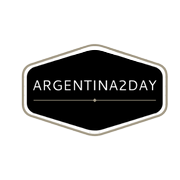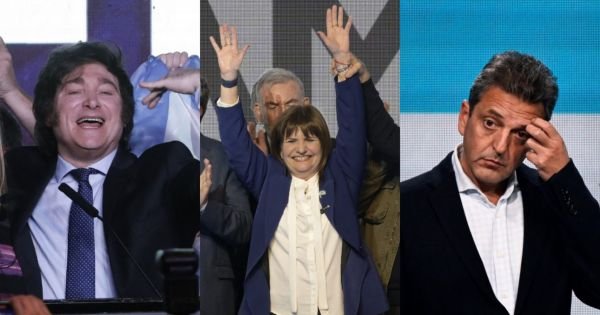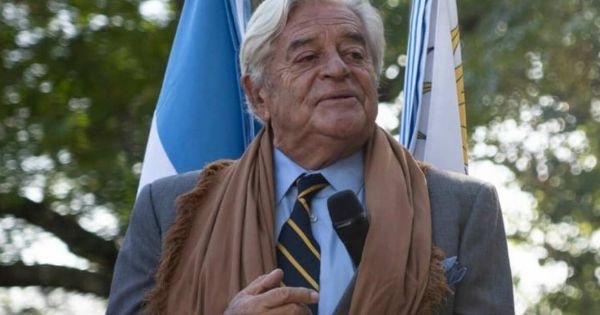[ad_1]
Argentina: Who can fix the political and economic problems?
The three candidates who will disputing the election next 22 October, Javier Milei, Sergio Masa and Patricia Bullrich
To most people’s surprise, the divisive libertarian populist Javier Milei won Argentina’s presidential primary. Milei took around 30% of the vote, triumphing in 16 out of the country’s 24 provinces.
The self-professed anarcho-capitalist is opposed to Argentina’s political establishment and wants to push through radical economic reforms. If he takes the presidency, the country will undergo a fundamental transformation. Argentina’s presidential primaries are generally seen as an important indicator ahead of presidential and congressional elections.
The election has given rise to a new economic and political scenario, says Jeronimo Pinedo, a social scientist and lecturer at the National University of La Plata.
Argentina has been mired in severe crisis for years now, marked by deep ideological divisions between political players, as well as an economy struggling with rampant inflation, foreign debt, and prolonged recession.
The markets responded promptly to Milei’s surprise victory: The official dollar exchange rate rose by 22%, and the Argentine Central Bank raised interest rates.
The incoming government will face the challenge of restoring political trust and economic stability in order to overcome Argentina’s protracted crisis. In October, voters will decide to whom they want to entrust this monumental task. They must choose between the libertarian Javier Milei, the incumbent Sergio Massa, and the conservative candidate, Patricia Bullrich. But what do the three candidates stand for?
Even when voting was mandatory, turnout was low at 69%, meaning some 30% of highly political motivated Argentines didn’t vote. Milei’s victory in the primaries marks a turning point in Argentine politics. The 52-year-old economist’s provocative stance and anti-establishment views spark heated debate. He blames the political caste for Argentina’s national crisis. After winning the primary, he promised: We will put an end to the parasitic and useless political caste in this country.
Milei is advocating radical neoliberal economic reforms. Among other things, he wants to introduce the US dollar as the official currency, abolish the central bank, and privatize public education and healthcare. His ideas are highly controversial. Social scientist Pinedo says that if Milei were to win the presidential election, it would probably lead to even more poverty and exclusion and even greater inequality.
Susanne Käss, who heads the Argentina office of the German Konrad Adenauer Foundation, is not convinced Milei would ultimately be able to push through his plans. She points out that even if he were to become president, he would lack the necessary support in the Senate and Chamber of Deputies to implement his agenda of radical reforms.
He couldn’t just march through here completely unchecked and turn the country upside down, Käss said.
Patricia Bullrich: Conservative economic liberalism
Patricia Bullrich is the presidential candidate of the right-liberal opposition alliance Juntos por el Cambio (Together for Change). The leader of the party of former president Mauricio Macri, she won almost 17% of the vote. The other Juntos por el Cambio candidate, Horacio Larreta, won 11%, bringing the party’s total share of the vote to around 28%.
Although her policies do indicate a certain ideological proximity to Milei, and she too represents market-liberal positions, Bullrich is a traditional politician. Unlike Milei, she wants to retain and respect the country’s institutions.
This is not the only difference between the two candidates. Patricia Bullrich has positioned herself firmly against the dollarization that Milei is so vehemently in favor of.
However, Susanne Käss explained: If she becomes president, she wants to abolish artificially set differentiated exchange rates, with immediate effect. This would mean there would no longer be any restrictions on the purchase of foreign currency. Bullrich believes this would be a way to strengthen the peso and stabilize the economy.
But she would probably not have an easy time as president, either. Despite sharing some of Milei’s political ideas, were she to win the election, the former interior minister is unlikely to be able to count on Milei’s support to get her projects through parliament.
He’s running as an anti-politician, said Carl Moses, an independent economic and political consultant whose focus is Latin America. If he were to support a government, or join it as a junior partner, his whole narrative would immediately fall apart.
Sergio Massa: The opponent of free-market liberalism
Sergio Massa has set himself up as the opponent of the economically liberal section of the political landscape. Currently Argentina’s economy minister, Massa represents the government alliance Union por la Patria (Union for the Homeland) — which many see as the big loser in these primaries. The party’s two candidates garnered a total of around 27% of the vote.
As minister, Massa, –also known as the pancake for his uncompromising political past and unlimited ambitios–,, last year took on the difficult task of leading Argentina out of its severe economic crisis.
According to sociologist Jeronimo Pinedo, he succeeded in managing the crisis — but was not able to resolve it.
Susanne Käss says that even as president Massa probably would not achieve this. There would be little change in the status quo, because what he’s proposing are the remedies that are already being applied under the current government.
Consultant Moses agrees that the policy currently being followed in Argentina is nearing its expiration date. If Argentina is lucky, the current policy will get it as far as the election, he said. After that, Moses warns, the economic course needs to be revised if the country is to be made creditworthy again in the medium term.
Even if Massa does not implement radical reforms, Moses says he does have one major advantage: He could form a larger, more stable coalition, because he is not as ideologically rigid as his opponents. As Moses sees it, Argentina’s problems are political rather than economic.
What Argentina needs is a government with a stable foundation, Moses said. Something that, so far, none of the three candidates seems to offer.
[ad_2]
Source link




